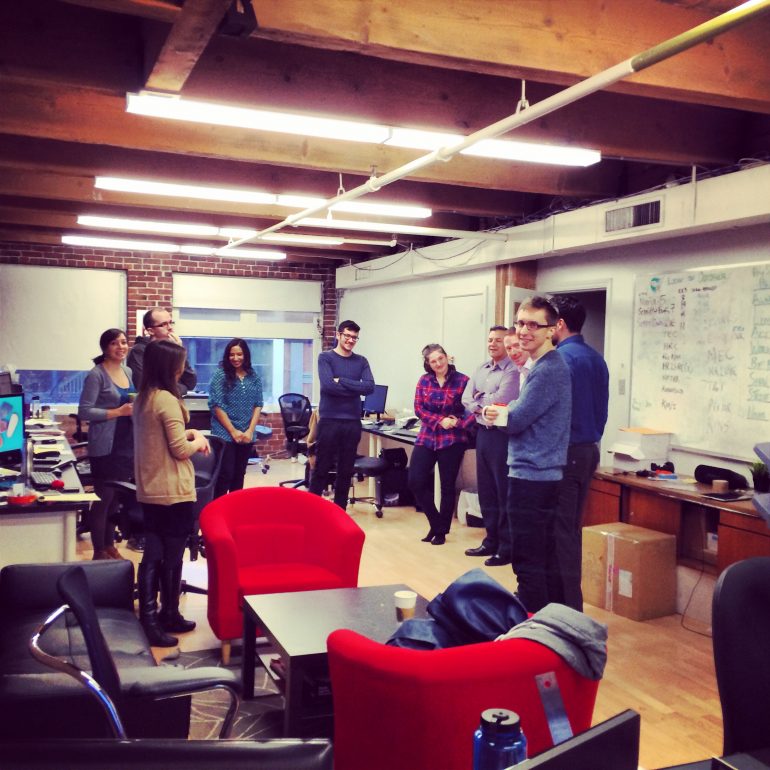When it comes to the company payroll system, all that matters for most people is knowing they’ll be paid the right amount on the right day. Yet for the person or team of people who administer that payroll, it’s having to deal with the actual systems that matters most. In many cases the concept of user experience never enters the conversation.
After researching a variety of verticals, and knowing they wanted to be an enterprise quality SaaS-based business, PaySavvy co-founder Wisam Abdulla said “we wanted to look beyond something that was just functional. We wanted to put a lot of thought into turning an old school enterprise application into software that put the user at the centre of the equation. We asked, why should a payroll system make it’s clients feel like they were dealing with a utility?”
This Vancouver-based company has been in business for just over three years, as was co-founded father and CEO Faiz Abdulla, and sons Wisam (COO) and Tim (CTO). The team of 20, with it’s Canada Revenue Agency stamp of approval, is a national payroll processor.
They’ve grown from being payroll focused to a comprehensive, and fully integrated web-based workforce management solution.
Talking with Wisam Abdulla about the challenges of being the new guys in a very well established industry, with two dominant competitors in ADP and Ceridian he said, “we wanted to reimagine the space of workforce management. In a mature industry, there’s not really a lot of room for some crazy ideas. People have been doing payroll since the days of the abacus. It’s really been more about looking at the industry through a different lens than it’s been looked at to date.”
While looking at this industry through a new and different lens, there was still the reality of overcoming a startup bias with potential customers used to dealing with suits & ties. They were also not speaking the language of the utility. Words like user experience and onboarding were Greek to many.
“It never starts out how you imagine things,” said Abdulla.
“In the last three years we’ve learned a lot. We found that in spite of the sheer numbers the small business space really wasn’t our fit. We now comfortable working with companies who have 100 to 5000 employees. Along with that shift in market fit, we had to change our messaging and branding to better communicate with our bigger clients. It all seems to be coming together.”
Looking at the future of this space, Abdulla is excited about the democratization of people analytics. The practice of using data to inform workforce-management planning and decision-making is a sizable opportunity. “By harnessing and unifying pre-existing sources of data as well as collecting new data, we are able to sketch a more complete picture of employees and their work-lives,” he told BetaKit. “This profusion of data allows us to both better understand the state of the workforce and to make predictions about the future.”
While the technologies that enable people analytics were previously exclusively the domain of large enterprises like Google and Microsoft, it’s now becoming possible for smaller companies to take advantage of the insights provided by this emerging field. For example, data can allow companies to make predictions about which new hires are likely to succeed, who is a good candidate for promotion, and who might possibly be at risk of leaving.
It’s one thing to create and deliver on a great product user experience as a core part of growing a successful company, which the PaySavvy team is doing. But it’s altogether another thing to have a company that’s also focused on bettering the human experience. For a team that calls Canada’s poorest postal code home, they’re doing just that too with The Neighbourhood Lunch Program.
Abdulla talked about how “it began on February 16, 2013. Our team gathered at 7am on a Saturday morning and put together 104 bagged lunches to hand out to people in the Downtown Eastside. Within 15 minutes the bagged lunches were all distributed, and the PaySavvy team knew that a tradition had begun.”
Since that time, dozens of generous volunteers and benefactors have come together to facilitate the lunch program. PaySavvy’s goal of 5,000 lunches was surpassed, with a total of 5,493 lunches handed out in 2013. The PaySavvy team wanted to do more than tick the box for corporate social responsibility. “It was important to our team to positively impact the lives of the people in our community,” explained Faiz. “We have built relationships with neighbours from all walks of life. It’s incredibly fulfilling to put our company’s influence to good use.”
PaySavvy is continuing the Neighbourhood Lunch Program in 2014, and will surpass last year’s goal with the continued help of volunteers and donors. Their next Neighbourhood Lunch is April 26th, and are always happy to take on more volunteers and donors. Anyone interested can email community@paysavvy.com




